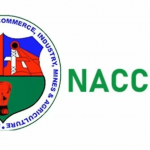The Nigerian Association of Chambers of Commerce, Industry, Mines, and Agriculture (NACCIMA) has voiced its readiness to collaborate with the federal government to tackle the nation’s economic challenges. Dele Kelvin Oye, NACCIMA’s National President, stressed that the private sector must support the government’s efforts to achieve economic recovery, especially as many micro and macro businesses continue to shut down across the country.
Oye made these remarks during a briefing in Lagos, emphasizing that the closures of businesses are affecting President Bola Ahmed Tinubu’s efforts to attract foreign investors. He noted that the private sector must play a vital role in helping Nigeria navigate these economic difficulties.
“NACCIMA is prepared to work closely with the government and other stakeholders to develop long-term intervention strategies for both local and international investors during this challenging period,” Oye stated. He encouraged all stakeholders to explore various options to help stabilize the economy.
He called on the government to urgently address the core issues affecting the country’s economic stability, including a review of monetary policies to reduce debt, deficit financing, and unnecessary expenditures. These actions, he noted, would help control inflation and stabilize the naira.
“Enhancing rural security and improving transportation infrastructure is critical for safeguarding lives and property. The government must also develop and clearly communicate an investor-friendly fiscal policy for 2024 and beyond,” he added. He also urged the government to simplify bureaucratic processes and reduce over-regulation to ease the burden on businesses.
Oye also highlighted the importance of opening up investment opportunities in key infrastructure sectors to the private sector. He criticized the government’s overreach, citing the Nigerian National Petroleum Corporation’s (NNPC) dual role as both a regulator and player, and called for policies that support businesses rather than hinder them.
“NACCIMA recognizes that this is a difficult period for businesses in Nigeria. While some multinational companies are exiting the market, others—both local and foreign—are expanding, which demonstrates confidence in the long-term potential of the Nigerian economy,” Oye stated.
He reiterated the need for NACCIMA to be involved in policy formulation, advising Tinubu’s administration to collaborate with the association in shaping economic policies. Oye also urged the government to provide clarity on key economic targets like inflation and currency management, noting that the absence of a published fiscal policy for 2024 has created uncertainty for many businesses.
“The recent statistics reveal a grim outlook for the final quarter of the year, particularly due to the impact of currency devaluation on major manufacturing firms,” he warned. However, he remained optimistic, acknowledging the resilience of several companies that continue to invest in Nigeria.
Oye praised local and multinational firms like Dangote Group, Mangal Cement, Nestle, Kam Steel, and others for their significant investments, which reflect their confidence in the Nigerian market. These companies, he noted, are a testament to the untapped potential of the Nigerian economy.
In conclusion, NACCIMA urged the federal government to focus on creating a business-friendly environment that supports economic growth, attracts investment, and fosters collaboration between the public and private sectors to navigate the country’s economic challenges.










